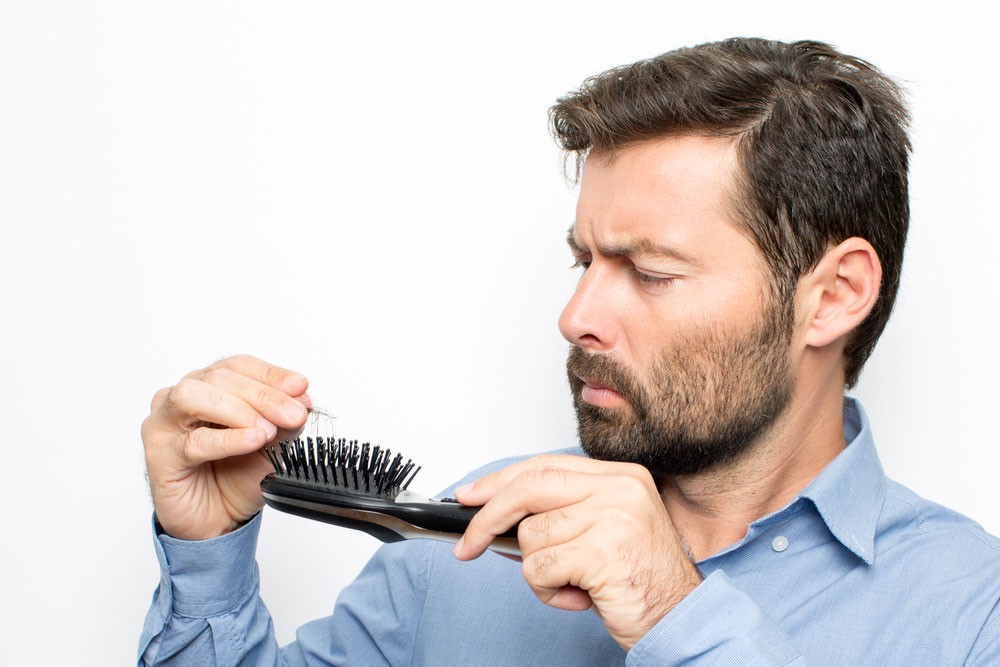Although men are more likely to suffer from hair loss than women, thinning hair and hair loss affect us all to varying degrees. On average, we each lose 50-100 strands of hair per day. Many of us experience thinning of our hair or abnormal hair loss at times in our lives. So why does this happen and what can you do about it?
Male “pattern baldness”, or androgenetic alopecia, is the most common type of baldness. It affects about 50% of all men by the age of 50 and over 80% percent by the age of 70. Usually, the hair recedes at the temples and leaves an M-shaped hairline.
Roughly 50% of women suffer from age-related mild hair loss, while about 20% suffer moderate or severe hair loss. The pattern of hair loss in women differs from that of men; women’s hair tends to thin over the top of their scalp.
Here are some common causes of hair loss:
Genetics
You may be genetically predisposed to hair thinning and loss, it’s thought that several genes determine how likely you are to lose your hair, and these can come both from your mother’s and father’s side of your family.
Stress
Any kind of physical stress, illness, surgery, accident or trauma can affect hair growth by upsetting the life cycle of hair and shocking it into the shedding phase. Usually, the hair loss starts being noticeable 3 – 6 months after the trauma.
One example of physical stress that can cause hair loss is pregnancy, due to the hormonal changes that occur in a woman’s body during pregnancy. Usually hair thinning or loss happens after delivery. This is normal and hair almost always grows back within a couple of months.
Hormones
Starting or going off birth-control pills and the change in hormonal balance that happens at menopause may have the same results.
Hormonal disorder polycystic ovary syndrome (PCOS), common among women of reproductive age, is another cause of hair loss due to hormonal imbalances.
Although emotional stress itself doesn’t necessarily cause hair loss, it can worsen existing problems that may cause it.
Nutrition
What you eat has a major impact on the health of your hair. Insufficient intake of nutrients including vitamins A, C, D, and E, iron, B vitamins, zinc, biotin, protein, and essential fatty acids can slow down hair growth or cause hair loss.
Taking too much Vitamin A-containing supplements can trigger hair loss. The recommended daily dose for adults is 5,000 International Units (IU) per day. This is a reversible cause of hair loss and hair should grow normally once any vitamin A levels are within a normal range.
According to the World Health Organization, hair-loss-causing iron deficiency (the most common type of anemia) affects nearly 25% of the population, with women most affected. This can easily be corrected, as can low levels of vitamin B, another cause of hair loss.
Medication
Certain medications may also promote hair loss. The most common are certain blood thinners and the blood-pressure drugs also referred to as beta-blockers.
Over styling
Styling your hair often and using chemical hair straightening products or high heat can cause your hair to fall out.
Try these tips to help prevent or remedy hair loss:
Eat a balanced diet
Eat a diet that is plentiful in fruits and vegetables as well as lean protein and “good” fats such as avocado and raw nuts and seeds. To increase your intake of hair growth-boosting nutrients, try to include foods such as beans, berries, spinach, sweet potatoes, bell peppers, and fatty fish like salmon, herring, and mackerel in your diet.
Manage stress
Manage your stress levels by, for example, practicing yoga, meditation, or spending time in nature.
Talk with your doctor
If you believe medications are to blame for your hair loss, talk with your doctor to find a solution. (S)he can also test your iron, vitamin A, vitamin B, and zinc levels and prescribe supplements to address deficiencies as well as determine if a hormonal balance or other underlying conditions are to blame for your hair loss and suggest treatment methods.
Avoid over-styling your hair
Avoid the use of chemical-laden hair products or exposing your hair to high heat such as that of blow dryers, curling irons, or very hot water. Condition your hair regularly and consider using essential oils to naturally strengthen your hair.
Try scalp massages
A 2016 study demonstrates how a daily 4-minute scalp massage for 24 weeks resulted in increased hair thickness. You can do this yourself, ask a partner or friend, or visit a massage therapist.
Starting today, use these recommendations to keep your hair strong, healthy, and growing.

